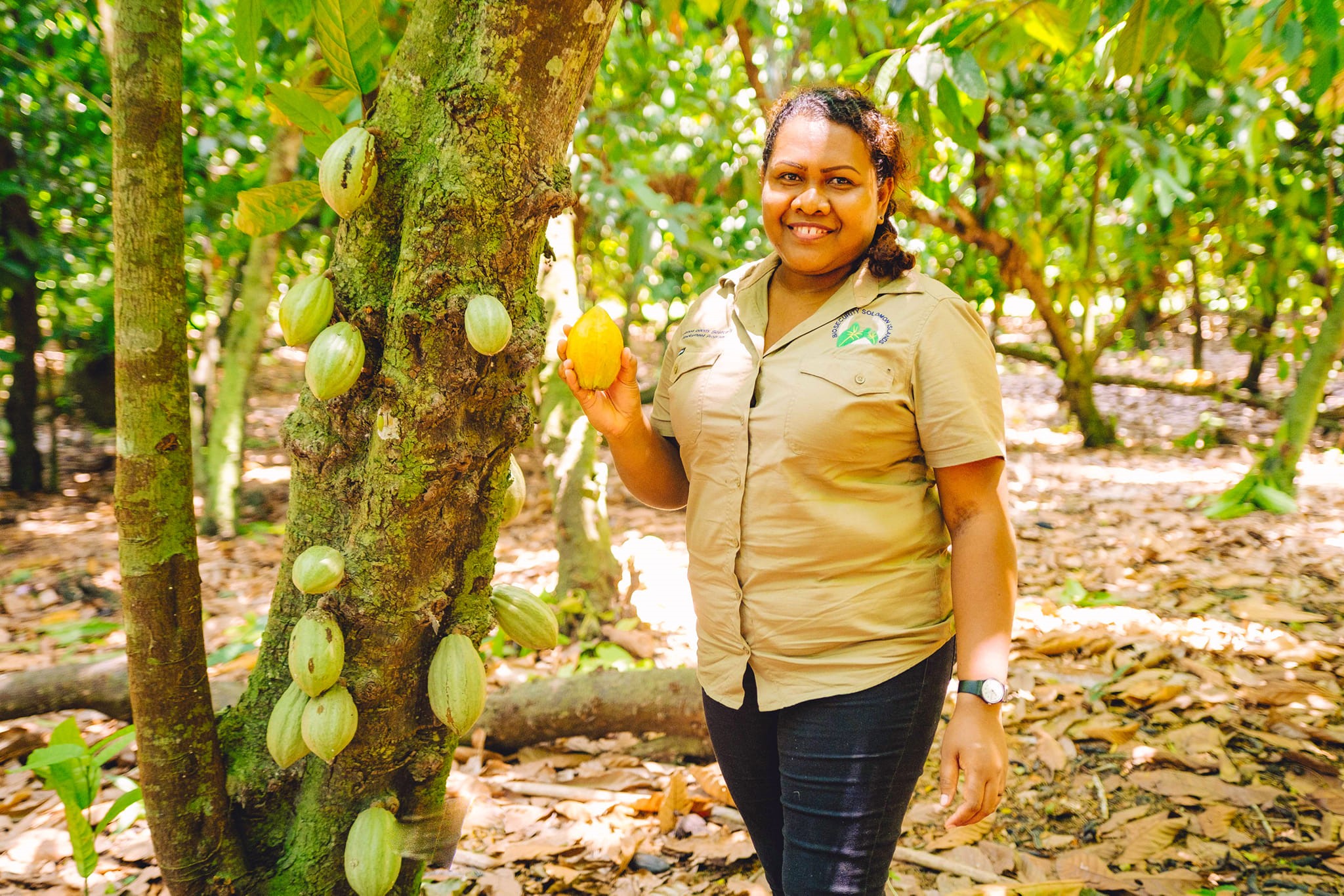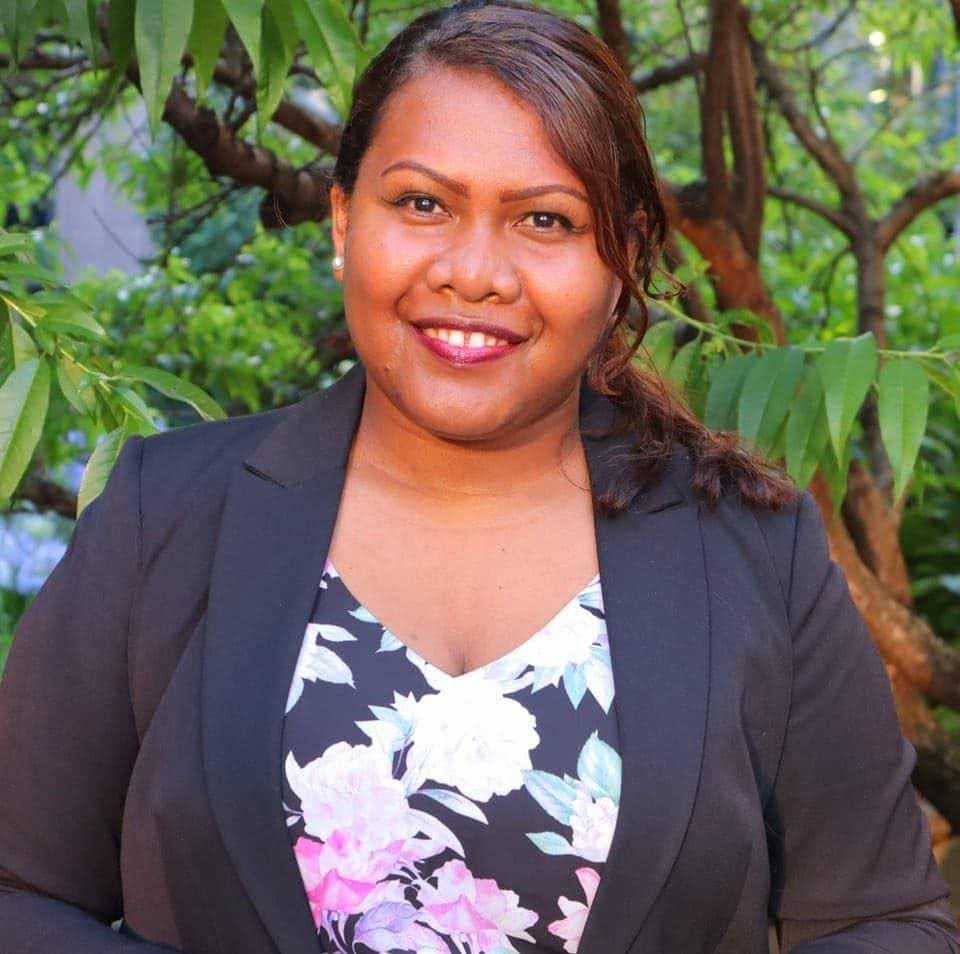WOMEN ON THE FRONTLINES: Samantha defies the odds

Samantha Maeke has defied the odds — and societal expectations in her native Solomon Islands — to end up where she is today.
She plays a prominent role in the country’s agribusiness sector as the Country Manager of the Australia and New Zealand-supported PHAMA Plus Program in Solomon Islands.
Sam, as she is widely known, is one of four women country managers out of a total of seven who lead the program’s efforts across 10 Pacific Island countries.
It’s a far cry from life on Ranogga, one of the smallest islands in the Solomon Islands’ Western Province where she grew up. There was no electricity and running water had just been introduced. “Women were not really encouraged to go to school,” she said. “We were bearers of children for our tribes.
“Because I belong to one of the biggest tribes on the island, the expectation was that I was also going to be the bearer of many children for my tribe.”
Even today, despite holding a role that works with heads of industry to improve the livelihoods of rural farmers, her tribe and family’s expectations of her remain unchanged.
“Each year as I would go home, they would say: ‘The clock’s ticking. You still have not borne children for the tribe. This is a disappointment.’”
But Sam had other aspirations. When she had the opportunity to receive primary school education on her island, she took it seriously. She left Ranogga at 12 to attend high school on a neighbouring island then moved to Honiara for further studies.
Education became a pathway to a different life. Today, she holds a diploma in business finance, a bachelor’s degree in climate change management, and a master’s degree in international and development economics, the latter two obtained under Australia Awards scholarships.
Studying in Australia came with the challenges of adjusting to a new place. There were also cross-cultural dynamics she had to navigate.
“The biggest challenge for me was related to learning,” she said.
“In Australia, there is no differentiation between whether you are female or male [within a learning environment]. You can just speak up. They expect people to talk, to ask questions and express your opinions. Imagine, back home as a female, especially when a senior male person in my society speaks to me, I look at his feet, lower my head and do not look them in the eye. That’s a sign of respect.
“It took me time because the tutor at university complained about me. He said, ‘I was not engaged’ but I was listening to everything he was saying, I just didn’t look into his eyes. If you don’t, they consider that rude. And so they spoke to me about my lack of engagement and I had to really work on it.”
Over time, she slowly became more comfortable with speaking up.
“The challenge was I was not living in Australia permanently, I had to come back to Solomon Islands. And so, I always have to strike a balance,” she said.
 “Now that I’m back home I am expected to be silent at tribal or cultural events when men speak. But as soon as I’m in another setting like interacting with the western educational system or the formal work force, I must speak up. That was something that I found particularly challenging back then, and now I’m glad it was a learning opportunity.”
“Now that I’m back home I am expected to be silent at tribal or cultural events when men speak. But as soon as I’m in another setting like interacting with the western educational system or the formal work force, I must speak up. That was something that I found particularly challenging back then, and now I’m glad it was a learning opportunity.”
As a young Solomon Islands woman in a leadership role working in heavily male-dominated sectors, Sam is mindful of the contexts she is operating within, and she adjusts her approach to suit each situation. Things have improved slightly where professional men in senior roles, especially those based in urban settings like Honiara, often listen to what she has to say.
“However, when I work in rural areas, I have to be aware and careful when I’m speaking so that they do not take it as disrespect.”
She relies on her principles to navigate tricky situations: “Industry and integrity are two of the principles I live by,” she said. “So, I work hard, I hustle. I sacrifice and I give it everything – that’s industry but equally important is integrity – who I am in private is who I am in public. They’ve helped me forge trust, stronger and more sustainable collaborations”.
What keeps her going are the opportunities to learn and make a meaningful difference in the lives of her people.
On learning she says: “I enjoy speaking to a great number of people from a wide range of backgrounds – both professional and traditional for work. I love learning about plant biology, animal diseases, how to negotiate international trade, how market systems work, when and how to plant crops based on traditional weather estimations. That’s the best thing about my job – working with so many people to help protect and maintain access to premium markets to improve rural lives.”
Finally, it is the ability to effect change that keeps her in the role: “Why I do what I do is when local exporters, businesspeople or rural farmers come and say, ‘Sam, my export market pathway is now protected. I don’t have to terminate my employees’ or ‘Sam, the importer still wants to buy my products. I can remain in business after all.’ I live for those moments.
“Working in the international development sector is challenging especially if you are a Melanesian woman and positive impacts take years to show but our partners stories is the most rewarding experience for me. That’s why I keep sticking around.”
-ENDs-

